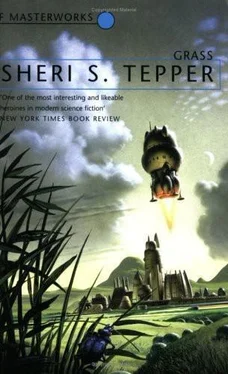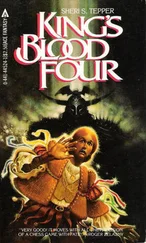Sheri Tepper - Grass
Здесь есть возможность читать онлайн «Sheri Tepper - Grass» весь текст электронной книги совершенно бесплатно (целиком полную версию без сокращений). В некоторых случаях можно слушать аудио, скачать через торрент в формате fb2 и присутствует краткое содержание. Город: London, Год выпуска: 2002, ISBN: 2002, Издательство: Gollancz, Жанр: Фантастика и фэнтези, на английском языке. Описание произведения, (предисловие) а так же отзывы посетителей доступны на портале библиотеки ЛибКат.
- Название:Grass
- Автор:
- Издательство:Gollancz
- Жанр:
- Год:2002
- Город:London
- ISBN:9781857987980
- Рейтинг книги:4 / 5. Голосов: 1
-
Избранное:Добавить в избранное
- Отзывы:
-
Ваша оценка:
- 80
- 1
- 2
- 3
- 4
- 5
Grass: краткое содержание, описание и аннотация
Предлагаем к чтению аннотацию, описание, краткое содержание или предисловие (зависит от того, что написал сам автор книги «Grass»). Если вы не нашли необходимую информацию о книге — напишите в комментариях, мы постараемся отыскать её.
Grass — читать онлайн бесплатно полную книгу (весь текст) целиком
Ниже представлен текст книги, разбитый по страницам. Система сохранения места последней прочитанной страницы, позволяет с удобством читать онлайн бесплатно книгу «Grass», без необходимости каждый раз заново искать на чём Вы остановились. Поставьте закладку, и сможете в любой момент перейти на страницу, на которой закончили чтение.
Интервал:
Закладка:
“Most uncomfortable,” Marjorie mused, lost in recollection of the sharp implacable spines on the necks of the mounts. “Is it really worth it?”
He shook his head. “I am no philosopher, Lady Westriding. If you were to ask my brother, he would say yes. If you ask me, I may say yes or no. But then, he rides and I don’t.”
“I ride,” said a voice from behind them. “But I say no.”
Marjorie turned to confront the owner of the voice, tall, broad-shouldered, not greatly younger than herself, dressed in stained trousers and red coat, his hunting cap under his arm and a full glass held to his lips. She saw that those lips trembled, though so slightly she doubted anyone but herself would have noticed.
“Forgive me,” he said. “I’m excessively thirsty.” His lips tightened upon the rim of the glass, making it quiver. Something held him in the grip of emotion, slurring his words.
“I can imagine that you are thirsty,” she said. “We met this morning, didn’t we? You look quite different in your… in your hunting clothes.”
“I am Sylvan bon Damfels,” he said with a slight bow. “We did meet, yes. I am the younger son of Stavenger and Rowena bon Damfels.”
Stella was standing with Rigo across the room. She saw Sylvan talking to her mother; her expression changed, and she moved toward the two of them, her eyes fixed on Sylvan as she came. There were other bows, other murmurs of introduction. Eric bon Haunser stepped away, leaving Marjorie and the children with Sylvan.
“You say no,” Marjorie prompted him. “No, that riding isn’t worth it, even though you ride?”
“I do,” he said, coloring along his cheekbones, his eyes flicking around the room to see who might be listening, the cords of his throat standing out as though he struggled to speak at all. “To you, madam, and to you, miss and sir, I say it. With the understanding that you will not quote me to any member of my family, or to any other of the bons.” He panted.
“Certainly.” Anthony was still very pale, as he had been since he saw the fox — or foxen, as most of the Grassians called the beast, meaning one or a dozen — but he had regained his poise. “If you wish it. You have our promise.”
“I say it because you may be asked to ride. Invited, as it were. I had thought it impossible until I met your husband. Now I still consider it unlikely, but it could happen. If it does, I caution you, do not accept.” He looked them each in the eye, fully, as though seeking their inmost parts, then bowed again and left them, rubbing his throat as though it hurt him.
“Honestly!” Stella bridled, tossing her head.
“Honestly, indeed,” said Marjorie. “I think it would be wise as well as kind not to repeat what he said, Stel.”
“Of all the snubs!”
“Not so intended, I think—”
“Those mounts of theirs may scare you, and they may scare him, but they don’t scare me! I could ride those things. I know I could.” Marjorie’s soul quaked within her, and it was all she could do to keep her voice calm. “I know you could, Stella I could, too. Given sufficient practice, I imagine any of us could. The question is, should we? Should any of us? I think we have one friend in this room, and I think that friend just told us no.”
6
The Arbai ruin on Grass is, in most respects, like all Arbai ruins: enigmatic, recently abandoned — in terms of archaeologic time — and speaking of some mystery which man can feel without comprehending. Other cities of the Arbai, those found elsewhere, are populated by wind and dust and a scattering of Arbai bones. So few Arbai remains have been found in those other cities that man has questioned why, with such a meager population, the cities should have been so large. They are large in terms of size, of perimeter, if not in terms of height or mass. They sprawl. Their much-crafted streets curve and recurve; their carved housefronts arc gently in concurrence. No vehicles have ever been found in any of the cities. These people walked or ran about their mysterious business, whatever it may have been.
Each city has a library. Each has a mysterious structure in the town square which is identified variously as a sculpture or a religious icon. Outside each city are other enigmatic mechanisms which are thought to be garbage disposers or crematories. A few have suggested they might be transportation devices, no ships having ever been found. Some people think they may be all three. If they are furnaces, the bodies of the inhabitants of the cities could have been burned, which would explain the sparse scattering of remains. Equally well, the inhabitants might have moved on somewhere else. The diggers and theoreticians cannot agree upon either alternative, though they have argued learnedly for generations.
In the more representative Arbai cities only a few whole skeletons have been found, always in ones or twos behind closed doors, as though those Arbai who had stayed behind after the others had gone were too few to attend to the obsequies of departure. Not so upon Grass.
On Grass bodies lie by the hundreds in the houses, in the streets, in the library and the plaza. Everywhere the Green Brothers dig, they find mummified remains.
Most of the digging over the years has been done by strong young men who have had little interest in what they uncovered. Inevitably, however, there have been a few who found themselves fascinated and enthralled by the ancient walls, the ancient artifacts, the ancient bodies. Some few have willingly given their lives to this work, applying all their intelligence to it. Sometimes there have been two or three of these fanatics at a time.
But only one man is currently focusing his intelligence upon the Arbai. He, like others before him, has learned to hide his genuine interest from those in authority. Brother Mainoa, once a miserable young acolyte of Sanctity, long since exiled and grown to suck-toothed age, to the shaggy gray locks and the wrinkled eye-pockets of an elder though to none of the honors some find in that estate; Brother Mainoa, like his predecessors an amateur, a lover of his work, has found his heart’s home amid these ancient stones. He has come to consider these trenchlike streets his own, these his dwellings and plazas, these his shops and libraries, though there is nothing in any of them that he can use or believes he will ever truly understand. Mainoa has uncovered almost half of the Arbai bodies himself. He has named them all. He lives out most of his life among them. They have become his friends, though not his only friends.
Of an evening, Brother Mainoa sometimes went away from the dig to a nearby copse where he could sit on a kneed-up root with his evening pipe, leaning against the trunk of the tree as he talked to the air. Tonight he reclined on his accustomed root with a sigh. His bones hurt. Not unusual. Most nights his bones hurt and some mornings, as well. Sleeping in barely heated quarters on a sack stuffed with grass didn’t help much, though he’d been less achy since he’d fixed the roof. He took a deep puff of fragrant smoke, let it out slowly, then spoke, as though to himself.
“The purple grass, now, not that Cloak of Kings stuff but the lighter purple with the blue bloom on it. that goes well with the rose. Tests out a complete protein mixed about two to one, very sustaining. Flavor’s nothing to proclaim at daily prayers, but it’ll come, it’ll come.”
A sound as of some huge, interested purring came from the tree, high above the old man’s head.
“Well, of course the yellowgrass is the old standby, just before I left the Friary last time to come down here to the dig, Elder Brother Laeroa told me he’d improved on it. I don’t know whether to believe that or not; it’d be hard to do. Yellowgrass is almost perfect as it is, just that there’s so little of it. It wants the tall orange stem on the sun side of it and something lower, like little green or middle ’zure, on the shade side, the blessed angels know why, but that’s the way it is. Elder Laeroa says he’s tempted to plant it in stripes and see how it does, but that’d stick out like a sore thumb…”
Читать дальшеИнтервал:
Закладка:
Похожие книги на «Grass»
Представляем Вашему вниманию похожие книги на «Grass» списком для выбора. Мы отобрали схожую по названию и смыслу литературу в надежде предоставить читателям больше вариантов отыскать новые, интересные, ещё непрочитанные произведения.
Обсуждение, отзывы о книге «Grass» и просто собственные мнения читателей. Оставьте ваши комментарии, напишите, что Вы думаете о произведении, его смысле или главных героях. Укажите что конкретно понравилось, а что нет, и почему Вы так считаете.












